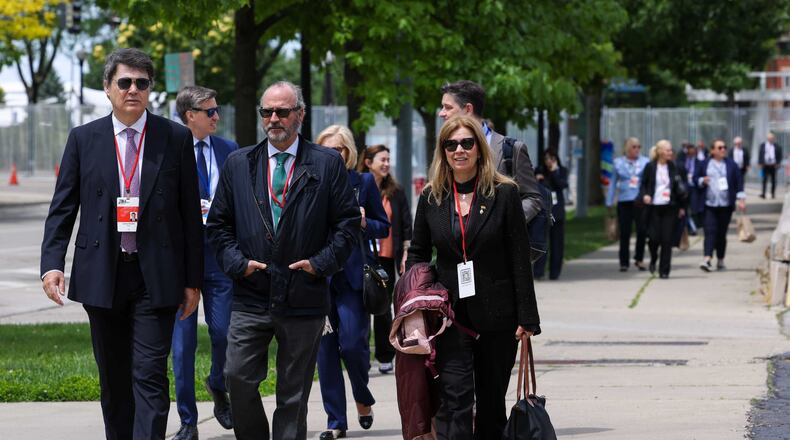The costs, benefits and downsides of the assembly were a hot topic before, during and after the multi-day spring session, which brought delegates, dignitaries, media and other visitors from around the world to Dayton.
Downtown hotels were pretty full, and some shops and restaurants said they did OK during the Assembly. But a large section of downtown was shut down for security reasons, which caused disruptions for businesses and residents.
Some business owners told this news outlet they had weak sales and many of their normal customers stayed away because of concerns about traffic, parking, protests and security headaches.
“I did get to take a shot of Malört with a Swedish delegate which was awesome, but the financial impact on our business was a net negative,” said Gus Stathes, owner of the Barrel House on East Third Street. “Monetarily, I sincerely hope that other businesses had a better experience than we did.”
Taxpayers footed some of the bill for the Assembly. The Ohio Department of Public Safety requested $4.3 million for security measures. Congress allocated $2 million for the event. The city of Dayton spent $1.5 million on downtown beautification efforts ahead of the assembly, though some of those were pre-planned improvements that were just expedited for NATO.
Economic impact
Destination Dayton says the NATO Parliamentary Assembly held downtown between May 23 and 26 had a $1.32 million direct economic impact.
Destination Dayton is a tourism and marketing organization that works to bring groups, sports tournaments, conventions and other out-of-town visitors to Dayton and Montgomery County.
The organization, which used to be the Dayton Convention & Visitors Bureau, says the $1.3 million estimate is based on the number of attendees (1,985), hotel room stays (2,870) and approximated spending on dining, transportation and retail.
Destination Dayton says the estimate does not capture spending during NATO PA scouting trips to Dayton or investments from non-Ohio sources, corporate partnerships or private donations. The organization also said the estimate does not include the $2 million in federal funds that Rep. Mike Turner, R-Dayton, obtained to help pay for renting and staffing local venues, catering contracts and production, artwork and signage expenses.
“While the economic impact figure represents a measurable piece of the story, the true value of hosting an event of this magnitude extends well beyond what can be captured in dollars alone,” said Petersen, with Destination Dayton.
Petersen said the NATO Parliamentary Assembly spring session in Dayton received more than 3,900 mentions in national and international media, and the value of the “earned media” was roughly $138 million.
Credit: Bryant Billing
Credit: Bryant Billing
Some local officials said the spring session put Dayton in the global spotlight and help put the community on the map.
Business impact
The Parliamentary Assembly was good for the Hilton Garden Inn Dayton Downtown, said James Bailey, the hotel’s general manager.
The Hilton Garden Inn, located in the northern part of the Dayton Arcade, was the host hotel for out-of-town media members and opened less than a week before the spring session got underway, Bailey said.
“Given our unique situation, we didn’t begin accepting reservations until two weeks prior since we weren’t certain we’d be open in time,” he said. “Had we been operational six months earlier, I’m confident we could have committed to hosting delegations and would have been even busier.”
Bailey said the NATO security zone, and the closure of Third Street in front of the Hilton Garden Inn, may have deterred non-NATO PA guests from booking rooms or dining at the hotel’s restaurant.
A large section of downtown was closed down and cordoned off by metal fencing during the assembly, and only people with credentials were allowed inside the security zone, which was called NATO Village. There was a huge police presence downtown.
Some shops inside the security zone closed down during the NATO-PA spring session, like Flying Pizza on North Main Street. Other businesses outside but near NATO Village also shut their doors during the assembly, like Teapot Cafe Lounge and Now and Zen DIY Studio on the 100 block of East Third Street.
Some business owners said they believed they would lose less money if they closed down, instead of paying staff and covering other costs to try to stay open.
Stathes, owner pf the Barrel House, said the tap house and bottle shop probably did better than some of the businesses closer to the security barriers, but foot traffic still was way down.
Stathes said he was told to expect an influx of customers, but that never materialized. He said many of the regulars who live in the suburbs did not come downtown, and Barrel House was left with an overabundance of product and lots of empty seats.
“It was certainly a bummer to have our expectations dashed, but at the end of the day we chalked it up a slow weekend,” he said. “It sucks, but it happens. We’re still here.”
Multiple businesses said they saw reduced foot traffic, including Mudlick Tavern, Salt Block Biscuit Company and Table 33.
Val’s Bakery on South St. Clair Street said sales were OK on a couple of days of the assembly, but they weren’t as high as normal. Wild Whiskers, a pet store a couple of doors down from Val’s, said business was very slow during the event and many of its normal customers steered clear of downtown to avoid traffic or parking challenges.
Following the assembly, Dayton Mayor Jeffrey Mims Jr. posted a message on Facebook that said, “We’ve come a long way. Once seen as a symbol of the Rust Belt, Dayton has fought hard to revitalize its neighborhoods, attract investment and reimagine its future. We’ve shown the world that Dayton is a place not just of history, but of potential. This event reaffirmed Dayton’s global relevance and opened doors to new partnerships, investment, and future opportunities.”
About the Author



